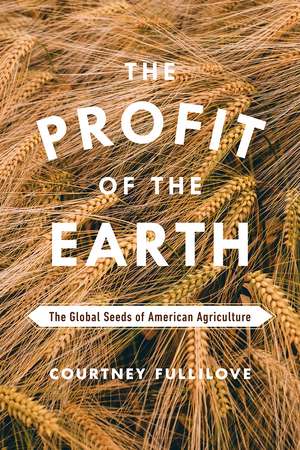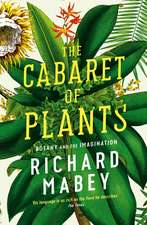The Profit of the Earth: The Global Seeds of American Agriculture
Autor Courtney Fulliloveen Limba Engleză Hardback – 15 mai 2017
While there is enormous public interest in biodiversity, food sourcing, and sustainable agriculture, romantic attachments to heirloom seeds and family farms have provoked misleading fantasies of an unrecoverable agrarian past. The reality, as Courtney Fullilove shows, is that seeds are inherently political objects transformed by the ways they are gathered, preserved, distributed, regenerated, and improved. In The Profit of the Earth, Fullilove unearths the history of American agricultural development and of seeds as tools and talismans put in its service.
Organized into three thematic parts, The Profit of the Earth is a narrative history of the collection, circulation, and preservation of seeds. Fullilove begins with the political economy of agricultural improvement, recovering the efforts of the US Patent Office and the nascent US Department of Agriculture to import seeds and cuttings for free distribution to American farmers. She then turns to immigrant agricultural knowledge, exploring how public and private institutions attempting to boost midwestern wheat yields drew on the resources of willing and unwilling settlers. Last, she explores the impact of these cereal monocultures on biocultural diversity, chronicling a fin-de-siècle Ohio pharmacist’s attempt to source Purple Coneflower from the diminishing prairie. Through these captivating narratives of improvisation, appropriation, and loss, Fullilove explores contradictions between ideologies of property rights and common use that persist in national and international development—ultimately challenging readers to rethink fantasies of global agriculture’s past and future.
Organized into three thematic parts, The Profit of the Earth is a narrative history of the collection, circulation, and preservation of seeds. Fullilove begins with the political economy of agricultural improvement, recovering the efforts of the US Patent Office and the nascent US Department of Agriculture to import seeds and cuttings for free distribution to American farmers. She then turns to immigrant agricultural knowledge, exploring how public and private institutions attempting to boost midwestern wheat yields drew on the resources of willing and unwilling settlers. Last, she explores the impact of these cereal monocultures on biocultural diversity, chronicling a fin-de-siècle Ohio pharmacist’s attempt to source Purple Coneflower from the diminishing prairie. Through these captivating narratives of improvisation, appropriation, and loss, Fullilove explores contradictions between ideologies of property rights and common use that persist in national and international development—ultimately challenging readers to rethink fantasies of global agriculture’s past and future.
Preț: 313.89 lei
Nou
Puncte Express: 471
Preț estimativ în valută:
60.07€ • 62.06$ • 49.99£
60.07€ • 62.06$ • 49.99£
Carte disponibilă
Livrare economică 04-18 martie
Preluare comenzi: 021 569.72.76
Specificații
ISBN-13: 9780226454863
ISBN-10: 022645486X
Pagini: 288
Ilustrații: 43 halftones
Dimensiuni: 152 x 229 x 25 mm
Greutate: 0.54 kg
Ediția:1
Editura: University of Chicago Press
Colecția University of Chicago Press
ISBN-10: 022645486X
Pagini: 288
Ilustrații: 43 halftones
Dimensiuni: 152 x 229 x 25 mm
Greutate: 0.54 kg
Ediția:1
Editura: University of Chicago Press
Colecția University of Chicago Press
Notă biografică
Courtney Fullilove is assistant professor of history, environmental studies, and science in society at Wesleyan University, in Connecticut.
Cuprins
Prologue: In the Field
Field notes. “Green Revolutions”: Hunting Turkey Wheat
Part 1. Collection: The Political Culture of Seeds
Part 3. Preservation: Indigenous Plants and the Preservation of Biocultural Diversity
Field notes. “Green Revolutions”: Hunting Turkey Wheat
Part 1. Collection: The Political Culture of Seeds
1. The Museum of Seeds
2. Seed Sharing in the Patent Office
3. Failures of Tea Cultivation in the American South
2. Seed Sharing in the Patent Office
3. Failures of Tea Cultivation in the American South
Field notes. “Local Knowledge”: What the Pastoralist Knew
Part 2. Migration: Wheat Culture and Immigrant Agricultural Knowledge4. For Amber Waves of Grain
5. Spacious Skies and Economies of Scale
Field notes. “Indigenous Knowledge”: Diversity and Endangerment5. Spacious Skies and Economies of Scale
Part 3. Preservation: Indigenous Plants and the Preservation of Biocultural Diversity
6. Elk’s Weed on the Prairie
7. The Allegory of the Cave in Kentucky
8. Writing on the Seed
Epilogue: In the Gene Bank7. The Allegory of the Cave in Kentucky
8. Writing on the Seed
Acknowledgments
Notes
Index
Notes
Index
Recenzii
“Fullilove organizes her work by seed processes—'Collection,' 'Migration,' and 'Preservation'—and adopts a dynamic, as opposed to static, stance for this sequence. She utilizes the US Patent Office and, later, the US Department of Agriculture to explore collection processes; discusses immigration and settlement behaviors of the Mennonites in late-19th-century Kansas for the circulation of seeds; and, finally, examines one aspect of seed preservation, the disturbance of the major grain monoculture, by focusing on biodiversity through invasive species. Periodically, Fullilove inserts field notes from her research to illustrate both the universal scope of seed dynamics and the trans-positioning of seeds across the globe. The net effect is to shift the focus from seeds as passive tools to vehicles reflecting political, economic, social, and cultural patterns—which is expressed well in her chapter ‘Writing on the Seed.’ Quite thought-provoking, this volume might best be directed more to advanced undergraduate and graduate readers and above. It is specifically recommended for collections in agricultural history, rural sociology, and anthropology. Recommended.”
“The Profit of the Earth takes as its premise that no matter how much human activity has narrowed this range, the history embedded in seeds can recover the biodiversity of the past, help scholars recognize the complexity of the present, and inform humanity about how to expand the possibilities of its future…. Fullilove has a knack for recovering historical subjects that, in both the literal and metaphorical sense, have been lost in the weeds. Never losing sight of the tragic dimensions of the Anthropocene, her end result cuts across the longest spans of time and the smallest dimensions of space to capture the making of an agricultural empire in its fullest historical scope.”
"[A] book focused on seeds and the knowledge and expertise of many generations of farmers, especially one of this quality, serves to remind us that there is little about agriculture or food production whose origin or present character can be confined within national boundaries. . . . Fullilove’s excellent and beautifully written book tells this story, and so much more besides, and reminds us of the vital importance of history in understanding the present and why and in what ways we may not necessarily be living in the best of possible worlds."
"Profit of the Earth is a fascinating read, shedding light on some of the people, entities, and themes in the United States during its formative century, about which I, for one, was largely unaware. The range of sources she uses, and the careful weaving together of their content, which continues through the endnotes, are truly impressive. For a relatively short book, it has a detailed, fourteen-page index, containing no less than eighteen referenced subheadings for 'Mennonite,' and fifty for 'wheat''! In sum, this is a very creative piece of quality scholarship for which Fullilove should be commended."
“Seeds are one of humanity’s earliest and best technologies. Centuries of seed selection have generated small, human-tweaked packages that deliver life, health, and beauty. The Profit of the Earth offers an insightful and engaging history of that ongoing process.”
“Fullilove is a genuinely original thinker whose insights transcend the boundaries between American and global history, as well as between the histories of science, technology, the environment, and capitalism. The Profit of the Earth shows how American agricultural development arose from the interactions with the natural environment—and one another—of farmers, government agencies, and entrepreneurs at home and overseas. It is a strikingly new portrait of how the United States became an agricultural superpower.”
“How did the United States become the breadbasket of the world? In this riveting book, Mesopotamian agriculturalists, Washington bureaucrats, plains farmers, and Russian scientists create new strains of grains, appropriate ancient knowledge, conquer foreign territories, and build a powerful state in the service of agricultural power and profit. Fullilove situates a quintessential national story—the farming economy of the midwest—in a global framework, forcing us to rethink the advent of modern agriculture in the United States.”
In The Profit of the Earth, Courtney Fullilove offers something different: an ambitious and creative study that uses the story of seeds to ask readers to rethink the origins of American agricultural exceptionalism. The central narrative examines the nineteenth-century institutions that allowed the nation to become a major breadbasket of the world… Fullilove argues that recovering knowledge systems and landscapes lost during agricultural modernization will prove imperative in our own era as many across the globe face food scarcity in the face of climate change. While this book is a fine addition to the history of seeds, it is also a prompt to learn from more diverse, inclusive, and traditional systems of agricultural knowledge.
"Seeds are more than simply vessels for commodity-crop DNA; they are repositories of human history. This is Courtney Fullilove’s central message in this book about the evolution of Americans’ perceptions and practices regarding collection and preservation of seed. Fullilove shows how custodians of seeds, including nineteenth-century government officials at the US Patent Office and twenty-first century scientists in Norway’s Global Seed Vault, created germplasm catalogs that erased sociocultural histories of agricultural laborers. . . . Showing how scholars might read seeds as historical objects is the primary objective of this provocative and well-researched book that draws on diverse archival resources as well as field investigations in Armenia, Syria, and beyond."
"Fullilove advocates a cultural history of seeds. If, she argues, we see seeds as products of biological evolution and stochastic processes, which we have enhanced through science, the resulting narrative will be linear and progressive. Her goal is to show that the history of agricultural expansion is as complicated, circuitous, and messy as human history... Fullilove opens a window onto the cultural, political, and economic history that lies behind the creation and transmission of seeds and thus places the history of life sciences within the broader context of American territorial expansion and economic growth."
"In this remarkable first book, Courtney Fullilove uncovers the many layers of forgotten and ignored history that tell the complex story of the origins of wheat. Fullilove’s key insight is that this history is neither linear nor easily known, but rather reflects the constantly changing circumstances of farming over the last ten thousand years and over much of the globe."
"This is a curious book. Nearly every page conveys the author’s curiosity and her insatiable appetite for collecting historical anecdotes, allegories, oddities, and, befitting the subject, seeds. (Interspersed throughout the text are “field notes” in which Fullilove uses tales of her seed-collecting explorations in central Asia to offer wide-ranging musings on how seeds should be understood as “deep-time technologies.”) The writing is sophisticated, erudite, and mesmerizing..."
"At every turn in The Profit of the Earth, Fullilove provides sharp analysis, theoretical sophistication, and compelling stories that are beautifully told...Contemporary conversations about agriculture can easily fall into bucolic or technocratic enthusiasms—whether panaceas rooted in locovore practices or novel forms of genetic engineering. Fortunately, Fullilove offers a valuable corrective by way of historical examples of bioprospecting and biopiracy. As such, this book should appeal far beyond scholarly circles to any-one interested in the genealogies of contemporary agricultural and pharmaceutical debates."





